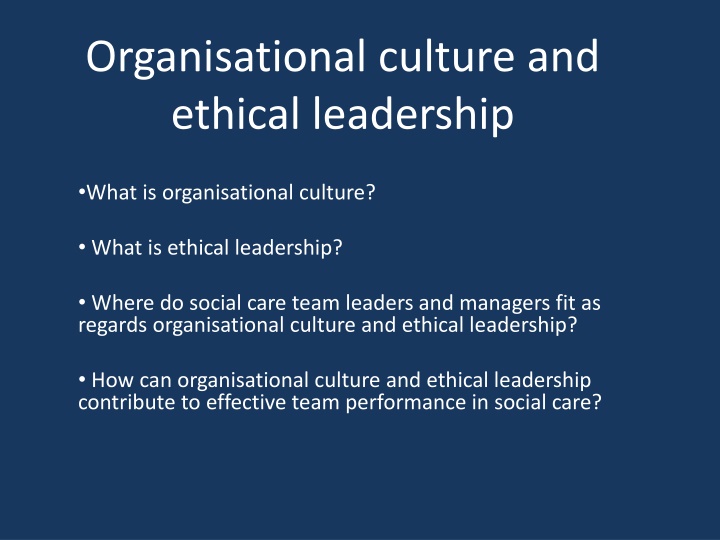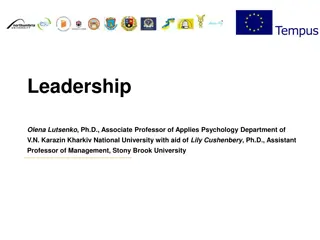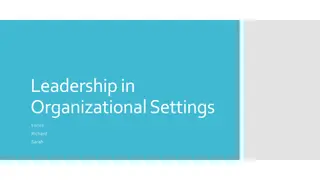Understanding Ethical Leadership in Social Care Teams
Organisational culture shapes behavior within an organization, while ethical leadership involves altruism, integrity, and proactive ethical standards. Social care team leaders play a crucial role in shaping organizational culture and promoting ethical leadership. Challenges exist in developing appropriate cultures and fostering ethical leadership, as identified by influential authors.
Download Presentation

Please find below an Image/Link to download the presentation.
The content on the website is provided AS IS for your information and personal use only. It may not be sold, licensed, or shared on other websites without obtaining consent from the author.If you encounter any issues during the download, it is possible that the publisher has removed the file from their server.
You are allowed to download the files provided on this website for personal or commercial use, subject to the condition that they are used lawfully. All files are the property of their respective owners.
The content on the website is provided AS IS for your information and personal use only. It may not be sold, licensed, or shared on other websites without obtaining consent from the author.
E N D
Presentation Transcript
Organisational culture and ethical leadership What is organisational culture? What is ethical leadership? Where do social care team leaders and managers fit as regards organisational culture and ethical leadership? How can organisational culture and ethical leadership contribute to effective team performance in social care?
What is organisational culture? Organisational culture can be defined as a system of shared values (principles, ethics) and beliefs that develops within an organisation and guides the behaviour of its members (French et al. 2011, p.339)
What is ethical leadership? Ethical leadership is about being altruistic (unselfish and humane), having integrity (honesty), being trustworthy and principled (values) in your decision- making based on regard for the well-being of those that you lead and manage as well as the rest of society Ethical leaders are proactive in wanting to change behaviours by communicating ethical standards, being a role model for ethical behaviour and holding others to account for ethical actions (Hassan et al. 2013)
Where do social care team leaders and managers fit as regards organisational culture? Schein (2010) considers organisational culture and leadership as two sides of the same coin (Schein, 2010, p.24) on the basis that culture is ultimately created, embedded, developed and manoeuvred by leaders If we consider our earlier two definitions this means that social care team leaders and managers can make an active contribution to organisational culture as ethical leaders
Where do social care team leaders and managers fit as regards organisational culture? Policy makers in Wales consider appropriate organisational cultures and ethical leadership to support person centred practice and citizen centred focused services You will be asked to read some documents that identify values and behaviours considered to be essential to support person centred and citizen focused services
However, developing appropriate organisational cultures and promoting ethical leadership has its challenges influential authors (e.g. Mintzberg, 1989; Alvesson, 2002; Schein, 2010) caution against thinking that it is as straightforward as: Successful organisational outcomes Organisational culture Leadership
Reference is made to cultural traffic (Alvesson, 2002) including the distribution and changes of ideas via the media, education, life changing events and geographical and social mobility Cultural traffic in social care teams: Influence of individuals and families/carers Influence of senior or executive leadership Changing legislation, policies and procedures Regulation and inspection Different workers attitudes, experiences, knowledge and behaviours ongoing changes including staff turnover Geographical and social mobility within the community and between different living spaces Different messages (can be conflicting) from across the organisation
Where do social care team leaders and managers fit as regards organisational culture? The idea of cultural traffic (Alvesson, 2002) encourages us to realise that more than one culture (known as a sub culture) can exist in an organisation at the same time and these sub cultures can be very different to each other This means that the leaders and managers of social care teams may have to negotiate a number of different values and beliefs at the same time; this is why ethical leadership is essential in social care it transcends (goes beyond) any organisational culture in the interests of person centred and citizen focused services, e.g. think about whistle blowing as something that challenges an existing culture
Social care team leaders and managers fitting with and negotiating different cultures Team leaders and managers can face challenges in negotiating a number of different values and beliefs. In practice this can mean: You are required to implement a new way of assessing risk with individuals some team members resist this because they have always done it that way You are the one in the middle as you seek to implement new ways of working via the direction of senior or executive leadership and the management of change with some of your team members who may be resistant to new ideas and ways of doing things
The examples given shows that social care team leaders and managers have a valuable contribution to make to organisational culture and ethical leadership: You will read an extract from the Social Care Leadership Framework 2012 which endorses leadership qualities (and how to achieve them) for staff working at different levels within organisations to develop high quality services this includes those working at leadership and management level Managers can make a positive contribution towards the development of high performing organisational cultures, particularly during challenging austere times when managers operate in an in between role, acting as advocates for employees and communicators from senior leadership (Carlstrom, 2012)
To conclude - Key messages about organisational culture and ethical leadership Organisational culture can be defined as a system of shared values (principles, ethics) and beliefs that develops within an organisation and guides the behaviour of its members (French et al. 2011, p.339) Ethical leadership is about being altruistic (unselfish and humane), having integrity (honesty), being trustworthy and principled (values) in your decision- makers based on regard for the well-being of those that you lead and manage as well as the rest of society (Hassan et al. 2013)
Cultural traffic means that organisational culture is not static in any team and organisation. Instead, it is constantly changing which means that organisational cultures and ethical leadership can be developed to promote person centred and citizen focused services within social care organisations this means that you can influence change for the better as a social care leader and manager Social care team leaders and managers have an essential contribution to make to the management of effective teams because they occupy a unique position between executive or senior leadership and operational team members - they are in a position to influence and be influenced by both to promote ethical values, beliefs and behaviours in social care
References Alvesson, M. (2002) Understanding organizational culture. London; Thousand Oaks, Calif.: Sage Publications . French, R., Rayner, C., Rees, G. and Rumbles, S. (2011) Organizational behaviour. 2nd edn. Hoboken, N.J.:John Wiley and Sons, Ltd. Hassan, S., Mahsud, R., Yukl, G. and Prussia, G. (2013), Ethical and empowering leadership and leader effectiveness , Journal of Managerial Psychology, 28 (2), pp. 133 146. Emerald [Online]. Available at: http://www.emeraldinsight.com (Accessed :28 May 2016). Mintzberg, H. (1989) Mintzberg on management: inside our strange world of organizations. New York: Free Press. National Skills Academy Social Care and Department of Health (no date) The leadership qualities framework for social care. Available at: https://www.nsasocialcare.co.uk/about-us/leadership-qualities-framework (Accessed: 27 May 2016). Schein, E. (2010) Organizational culture and leadership. 4th edn. Electronic books [Online].Available at: www.dawsonera.com (Accessed: 17 June 2014).























